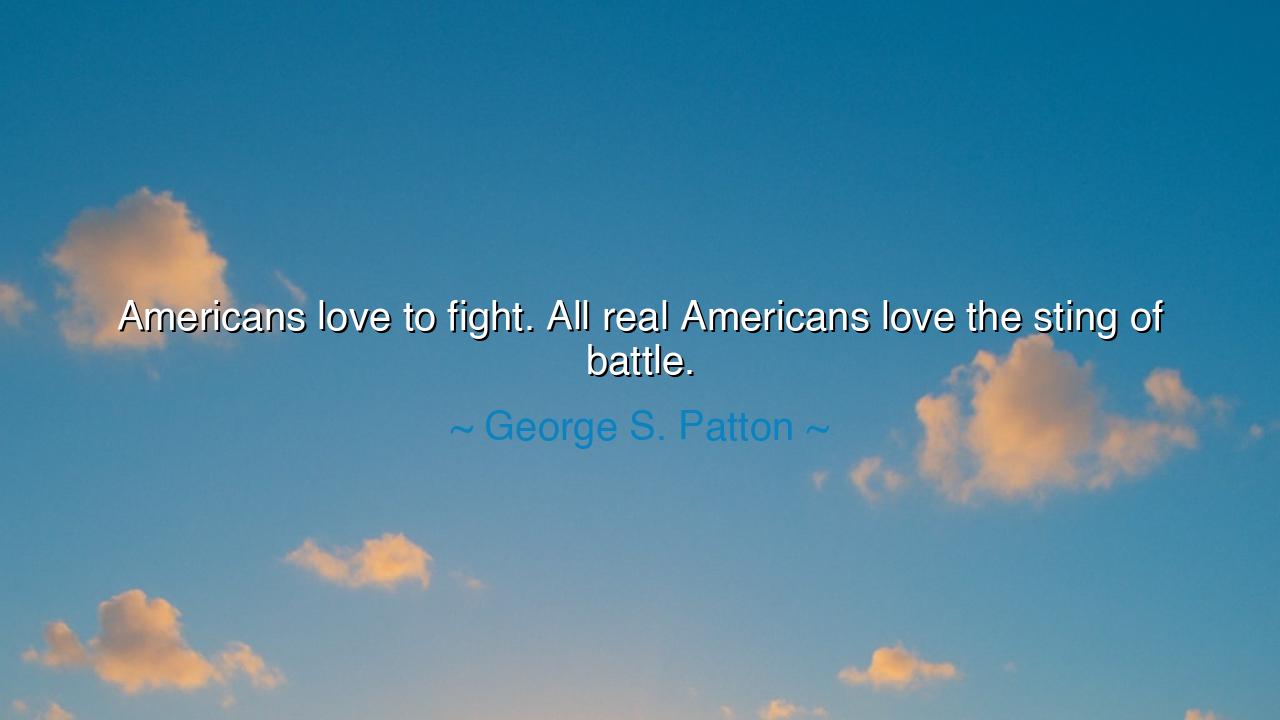
Americans love to fight. All real Americans love the sting of






“Americans love to fight. All real Americans love the sting of battle.” — George S. Patton
When General George S. Patton thundered these words before his soldiers in the fires of the Second World War, he was not merely speaking of war — he was speaking of spirit. For in his voice burned the ancient fire that has always driven humankind to rise against challenge, to meet struggle with courage, to turn hardship into triumph. When he said, “Americans love to fight,” he did not glorify violence; he glorified the unyielding will to stand firm in the face of adversity. The “sting of battle” he spoke of was not just the clash of arms, but the test of heart — that moment when one’s soul is measured by the fire of action.
The origin of these words reaches back to March 1944, when General Patton, commanding the U.S. Third Army, addressed his troops in preparation for the D-Day invasion. The world then hung in the balance. Europe groaned under tyranny, and freedom itself was a wounded giant. Patton knew that his men would soon face unimaginable hardship — mud, fear, and death itself. But he also knew something deeper: that the human spirit, when awakened by purpose, finds strength even in pain. His speech was not meant to stir hatred, but valor. He reminded them that to fight for what is right is not to descend into savagery, but to rise into nobility.
The “sting of battle”, as Patton described it, is the pure essence of challenge. It is the feeling of life at its most intense — when doubt vanishes, and every heartbeat declares, “I am alive.” It is the same flame that burned in the hearts of ancient warriors at Marathon, in the soldiers of the Union who stood at Gettysburg, and in the astronauts who dared to leave the Earth’s embrace. Patton’s words, though born in a time of war, speak to every age: the world belongs not to the timid, but to those who meet the sting of struggle with courage and resolve.
There is an ancient echo here, reaching back to the philosophers and poets of old. Heraclitus once wrote, “Out of war, all things are born.” He meant that conflict — not of violence, but of testing — gives rise to growth, transformation, and renewal. So too did Patton see battle not merely as destruction, but as revelation. It strips away pretense and reveals the truth of a person’s character. In peace, one may speak of courage; in conflict, one proves it. Thus, the love of battle is not a love of bloodshed, but a love of becoming — of facing one’s limits and discovering that they can be overcome.
Consider the story of Patton himself — a man both brilliant and controversial, whose passion often burned brighter than his restraint. He was a student of history, a believer in destiny, and a soldier who saw in every fight a reflection of the eternal struggle between chaos and order. During the North African campaign, when his men faltered under the scorching desert sun, Patton rode among them, shouting, “Courage is fear holding on a minute longer!” In that moment, he embodied his own creed. He understood that what he demanded of his soldiers was not recklessness, but endurance — the willingness to press on when every part of the body cries for retreat. That is the sting of battle he spoke of: the pain that becomes purpose.
Yet, Patton’s words transcend the battlefield. For in truth, every human life is a campaign, and every person must one day face their own battles — not with rifles and tanks, but with doubt, loss, and adversity. The lesson is not to seek conflict, but to meet it with courage. When challenges arise, do not flee. When the world tests your strength, rise and answer. For only through struggle do we find the measure of our own souls. In every failure overcome, in every fear conquered, we taste the same sharp sweetness that Patton called the “sting of battle.”
The lesson is this: welcome struggle as a teacher, not as an enemy. Do not curse the difficulties that test you — for they forge the steel of your character. Live boldly, face hardship with honor, and stand tall in the storms of life. Patton’s words are not a call to war, but a call to courage — to fight for what is just, to defend what is true, and to refuse surrender in the face of despair.
So remember the wisdom of George S. Patton: “All real Americans love the sting of battle.” In its truest sense, this means that all real human beings — wherever they dwell — must learn to love the challenge that shapes them. For the soul that never struggles, never grows. And when your moment of trial comes, when the world grows dark and uncertain, do not shrink away. Embrace the sting, and through it, discover the strength that was waiting within you all along.






AAdministratorAdministrator
Welcome, honored guests. Please leave a comment, we will respond soon